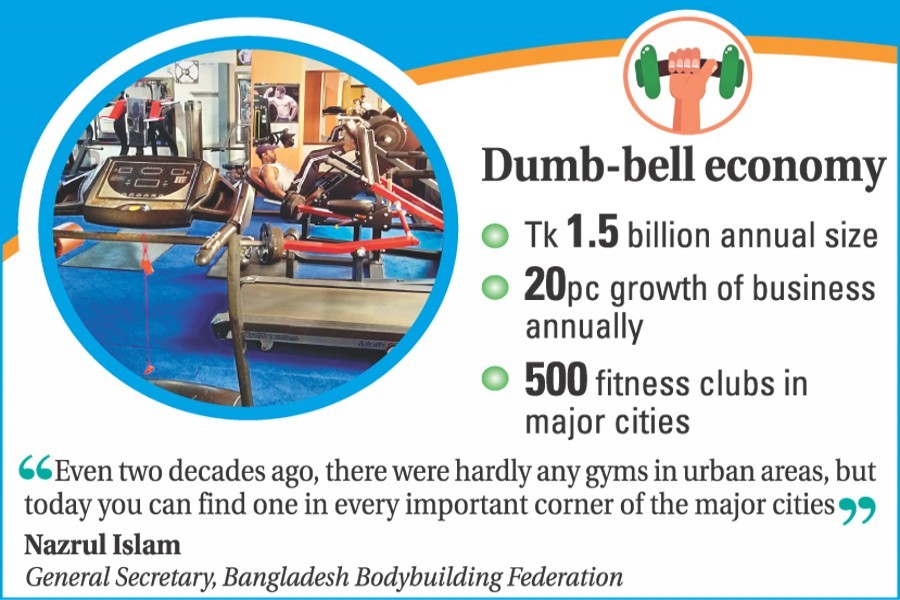Fitness industry is thriving in the country propelled by urbanites who seek to fight their sedentary lifestyle through exercises.
Between 2011 and now, the number of fitness clubs in major cities trebled to around 500, according to people involved in the country's wellness industry.
Bangladesh is one of the fastest-urbanising nations in Asia. Some 35 per cent Bangladeshis now live in urban areas, compared with only 5.0 per cent in 1960, the World Bank data shows.
Including club subscription fees, industry insiders estimated that the business of wellness will be as big as Tk 1.5 billion a year.
Bodybuilding hype has given rise to the concurrent boom in gym merchandise business as well, they said.
The growth in what is known as "dumb-bell economy" has lured local industrial conglomerates and multinational players.
Jamuna Fitness Centre nestled within Dhaka's Jamuna Future Park is believed to be the biggest centre by area and equipment, followed by Adonize Fitness Centre Ltd.
Adonize is situated in the Basundhara City Shopping Mall in Dhaka.
"We've 1,000 members. Users' traffic start growing in the afternoon," said Tanzina Akter, marketing manager of Adonize.
VLCC, an India-based multinational wellness firm, also forayed into Bangladesh to tap the growing market.
The company's outlets are visited by well-heeled customers and women who go for doing exercises. It also offers services like slimming.
Even small and medium firms are tapping into the new-found opportunity of wellness business.
One beneficiary of the fitness business boom is Ashraf Khan Palash, who owns body-building firm Galaxy Gym in Dhaka.
Mr Palash started up the gym business seven years ago on the Chittagong Road in Narayanganj when the users' traffic was thin.
"Now, I have two branches. The last one is at Demra in Dhaka," he said.
Today, two gyms have more than 100 members who pay Tk 500 a month as subscription fees, he said.
But the luxury health clubs charge much higher subscriptions fees-as high as Tk 75,000 a month.
Besides, there are many boutique gyms in luxury hotels and resorts apart from thousands of residential apartments that are equipped with exercising equipment.
"The boom has occurred in the past few years," said Nazrul Islam, general-secretary of the Bangladesh Bodybuilding Federation. Mr Islam is a recipient of 'Mr Bangladesh Trophy,' the highest bodybuilding award in the country.
"Even two decades ago, there were hardly any gyms in urban areas, but today you can find one in every important corner of the major cities."
He, however, said that the rate of access remains lower than that of the United States or even India.
Nearly 500 gymnasiums have sprung up in Dhaka, Chittagong and Sylhet and the business is expanding at a rate of 20-25 per cent a year, according to the Bangladesh Bodybuilding Federation under the government's National Sports Council.
"It is necessary as exercise increases cardiovascular fitness and boosts overall health," said Habib Ullah Dawn, a director of the Federation of Bangladesh Chambers of Commerce and Industry, the top trade body.
He said regular workouts also help reduce stresses, anxieties and depression and other diseases affecting health.
"I stay in good mood after exercises and I cannot leave it," said Mr Dawn, who has been a passionate exerciser for more than 35 years.
The boom in dumb-bell economy is real.
"The growth in fitness business is incredible," said Manatosh Ghose, a pioneering fitness instructor, locally known as "ustad."
"We started our journey in the early 70s with the objective of inspiring young people to promote social values," Mr Ghose, who built Sando Gym in Chittagong city in 1974.
Talking about the bodybuilding movement for enhancing social values, Mr Ghose said: "Yes, I'm successful as my theme has worked well."
Mr Ghose was trained by Abul Fazal who went the then West Pakistan for job purpose.
Once the gymnasiums were concentrated on downtowns of the major cities, now those have now spread to outskirts as well.
Mr Akbar of Novojug Gym in the older parts of Dhaka, told the FE, "Now people from all strata of the society come to the gyms."
"I get astonished when I see a large number of women show their interest in gym," he said.
The fitness business has picked up steam in recent years, though the wellness movement began in the 1970s.
City corporations or municipalities used to patronise fitness clubs in Dhaka and Chittagong and they charged nominal fees.
In the 1980s, local juvenile and youths would visit gyms with the motive of flaunting their well-groomed bodies and muscles in the society.
Presently, the elites, the rich and high-paying corporate executives are enrolled in well-equipped bodybuilding clubs located in major metropolises.
There are a number of elites and businesses go to the luxury clubs for doing exercises which attribute so as to counter the side-effects of their hectic urban lifestyles.
Habibur Rahman, a professor of physical medicine at the National Institute Of Traumatology and Orthopedic Rehabilitation (NITOR) told the FE that rising income and health consciousness are helping exercise habits grow in the metropolis areas.
He said the number of people visiting gyms would increase day by day as this entailed health benefits.
He said that regular exercises lower the risk of developing diabetes, metabolic syndrome and some types of cancer, such as colon cancer and breast cancer.
Combining aerobic exercise with strength training at the gym helps muscles, ligaments, joints and tendons remain in good shape, which will make people stronger and more flexible.
He said high blood sugar, obesity have emerged as not only health but also a social problem these days.


